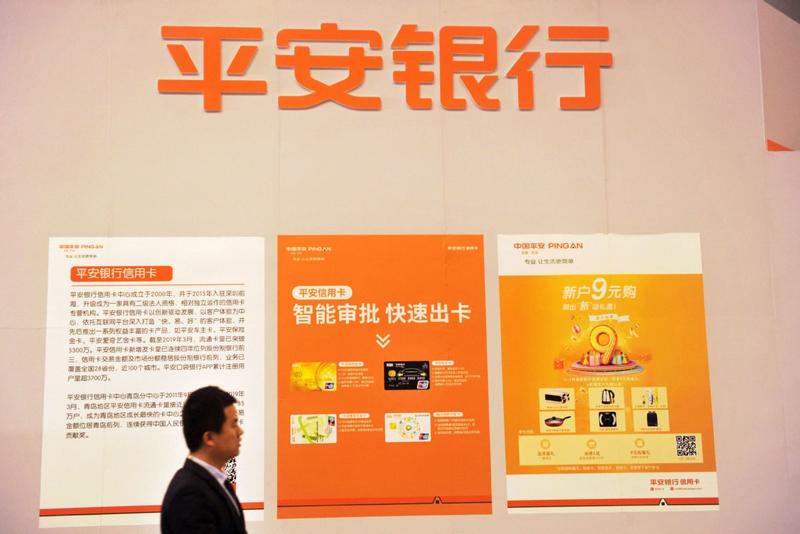 A visitor walks past a Ping An Bank display panel at a financial exhibition in Qingdao, Shandong province. (PHOTO PROVIDED TO CHINA DAILY)
A visitor walks past a Ping An Bank display panel at a financial exhibition in Qingdao, Shandong province. (PHOTO PROVIDED TO CHINA DAILY)
Commercial banks are going full steam ahead in offering online financial services by adopting a range of technologies, amid the novel coronavirus outbreak in China.
With both large and small banks accelerating the trend of internetization and digitization, customers will see further development of online financial services after the outbreak, analysts said.
To help clients avoid unnecessary travel during the epidemic, Ping An Bank Co Ltd has provided a 24/7 product consultation service online. Based on big data analytics and natural language processing technologies, its artificial intelligence-powered customer service agents can forecast deeper demands of clients and push notifications on what they care about, in addition to delivering agile responses to customer inquiries.
Online lending services, especially loan approvals for small businesses, will develop further with the support of financial technologies
Wen Bin, Chief analyst at China Minsheng Banking Corp
ALSO READ: Digitalization of local services spells jobs
The Shenzhen-based joint stock commercial lender has also launched video and audio lessons on family protection plans and pension plans, offering clients online education and consultation services on wealth management. Its private banking unit has also provided asset allocation services to qualified clients via artificial intelligence-powered smart vision and signature verification technologies.
Bank of China Ltd, a large State-owned commercial lender, launched an anti-epidemic section on its mobile banking platform, with a focus on epidemic control and financial activities. It is providing more than 30 types of online services in the section, including searches for real-time information about the epidemic, free online medical consultation, payment of living expenses, investment and wealth management.
By the end of Monday, the number of page views in the section totaled 18.71 million, and the number of unique visitors had reached 3.09 million.
With a growing number of companies resuming normal operations, banks have stepped up online lending services to businesses, especially micro-and small-sized enterprises engaged in epidemic control or production of the basic necessities of life.
Supplying more than 200 supermarkets with flour, brown sugar steamed bread and various types of frozen pastry, Junkai Food Co Ltd in Haishu district of Ningbo, Zhejiang province, is among the first batch of small businesses that obtained provincial permits for emergency supply transportation during the fight against the epidemic. The company was in urgent need of money to purchase raw materials because of a rapid increase in food demand.
China Zheshang Bank Co Ltd, a commercial lender headquartered in Hangzhou, Zhejiang province, issued a 500,000 yuan (US$71,687) loan to Junkai Food without asking for a collateral, based on trust and credibility built through their cooperation in the past.
It took slightly over an hour for the company to go through the entire procedure online-from filling out a loan application to withdrawal of money.
"Online lending services, especially loan approvals for small businesses, will develop further with the support of financial technologies," said Wen Bin, chief analyst at China Minsheng Banking Corp.
Compared with large companies, small businesses in general have higher risks and higher operating costs. By obtaining loans online, their financing costs will be notably reduced.
"More importantly, through cooperation with third-party internet or fintech companies on data analytics, banks will generate accurate profiles of small businesses and better calculate corporate credit scores. This will help banks reduce the reliance on collateral for corporate loans," Wen said.
"By further promoting digital development and strengthening the creation of business scenarios, banks will play a greater role in helping small businesses overcome financing difficulties and lower financing costs," he said.
READ MORE: Where digitization goes next
The ongoing epidemic brought a huge opportunity for the banking sector to do business by using financial technologies, said Ye Yanfei, an inspector of the Policy Research Bureau of the China Banking and Insurance Regulatory Commission, at a news conference on Feb 24.
"Financial institutions should increase investments in technologies and improve their research and development capabilities. Small financial institutions may strengthen cooperation with credible fintech companies under the premise that both parties' rights and responsibilities are specified," Ye said.
"In the meantime, financial regulators should adapt to the development of financial technologies, increase their tolerance for technologies, and encourage financial institutions to innovate."


